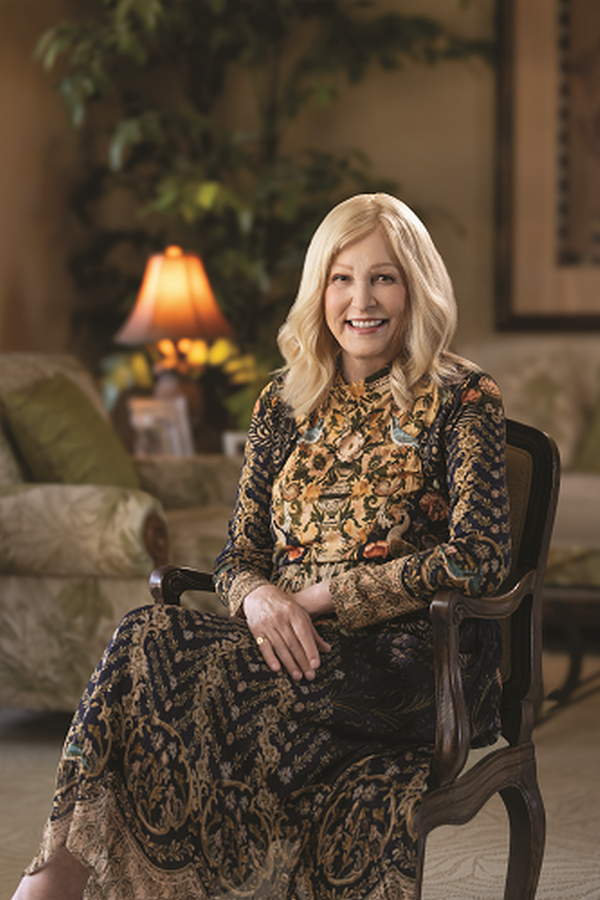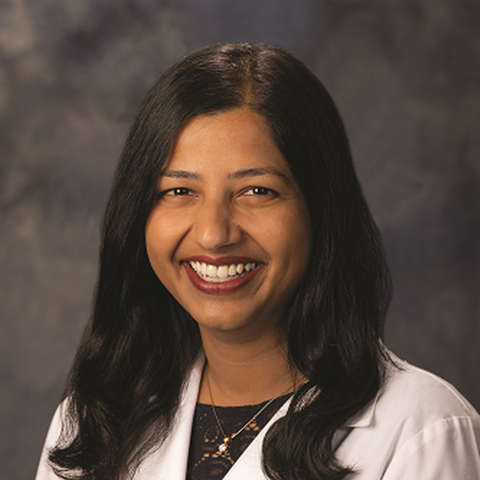Positivity and Paying it Forward

Named for the free-spirited character “Scarlett O’Hara” in Gone with the Wind, Adams is not going to change her positive attitude now, even if she faces triple-negative breast cancer (TNBC), the most aggressive form.
“I tend to be a forward-looking person,” says Adams. “I stay optimistic, busy and do the best I can day-to-day. For me, that’s the solution.”
She credits doctors at Eisenhower Lucy Curci Cancer Center and its affiliation with UC San Diego
Health Cancer Network for her survival from a diagnosis of metastatic breast cancer since November 2018.
“I’m grateful for the care I’ve received at Eisenhower Health and UCSD, and for the research in triple-negative breast cancer,” says Adams.
The unexpected diagnosis
TNBC, which represents about 10 to 15% of breast cancers, typically is harder to treat and more likely to recur than breast cancers that are hormone receptor-positive. For Adams, the news came in a routine mammogram, which revealed a tumor in her right breast. Further tests showed the cancer had spread to her brain and one lung.

Adams had a partial mastectomy and began chemotherapy. When two therapies failed, her doctors offered her a new medication, Trodelvy®, which consists of an antibody (an immune system protein) linked to a chemotherapy drug. Its superpower: the ability to cross the blood-brain barrier.
“That has been my lifesaver for the last few years,” Adams says.
Growing up, Adams thought she might become a surgeon or an X-ray technician.
She moved from Beverly Hills to Palm Springs at age seven with her father, a trauma surgeon and single dad, after he and her actress mother divorced.
“My father would get a call from the Desert Hospital emergency room and drop me off at the X-ray department,” she recalls.
Pouring through her father’s textbooks, she found herself drawn to the illustrations. She graduated from Palm Springs High School and immersed herself in art studies at College of the Desert. After a year of participating in pageants, she double-majored in design/fine art and art history at University of Southern California.
Over the years, she used her business and artistic talents to design office interiors and uniforms, high-end retail packaging and USC Trojan cheerleading outfits. She also spent a decade running six Kentucky Fried Chicken franchises.
She’s currently involved in marketing and product development for a private label chocolate manufacturer led by her husband, Bill Adams, whom she met in Palm Springs in 2007. She divides her time between the desert and Colorado - "I love both places” - and adds in trips to Hawaii when she feels well enough to travel.
Collaborating for advanced care
Thanks to a cooperative agreement between hospitals, Adams is able to get her infusions at Aspen Valley Hospital in Colorado. She also has received care from UCSD’s TNBC experts, thanks to the affiliation that was launched in 2018..
“Our affiliation with UC San Diego Health Cancer Network gives our patients access to more clinical trials and innovative treatments,” says Dr. Vulchi. “Also, an advantage is the weekly shared tumor boards where our physicians present complex cases alongside UCSD experts.”
Lucy Curci Cancer Center is home to the Eisenhower Schnitzer/Novack Breast Center in Rancho Mirage and La Quinta, along with the Anne and Kirk Douglas Breast Center in Palm Springs. State-of-the-art technology includes 3D digital mammography, breast-specific MRI and breast-specific gamma imaging, which can identify breast cancer undetected by mammography.
Adams wants others to be able to access the game-changing care she’s experienced; however, she began her donor relationship with Eisenhower Health long before she needed its help. In 2012, as trustee of an aunt’s estate, she contributed a significant gift to the 24/7 Recognition program. Since then, she has made other donations. For three years, she has funded educational opportunities that enable oncology nurses to attend conferences and share what they have learned.
Now 76, Adams has outlived standard expectations for her disease.
“She’s a fighter,” says Dr. Vulchi. “She’s remarkable.”
To Adams, the trick is her confidence in science and in taking action.
“I am always in tune with looking for the best result, best cure, best way to handle something,” she says. “You’ve got to be proactive.”
Learn more about breast cancer screening by visiting
EisenhowerHealth.org/Breast or calling 760.773.2038.



